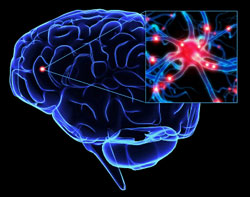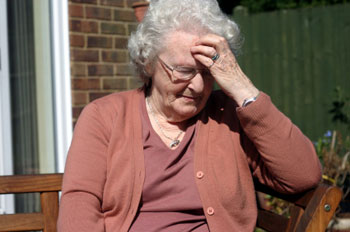Free US Shipping for Orders over $40
What is Dementia?
June 27, 2017
Dementia is a collective term used to describe the problems that people with various underlying brain disorders or damage can have with their memory, language and thinking. Alzheimer's disease is the best known and most common disorder under the umbrella of dementia.
Contents of this article:
- What is dementia?
- What causes dementia?
- Signs and symptoms
- Tests and diagnosis
- Treatment and prevention
What is dementia?
Dementia is not a single disease in itself, but a general term to describe symptoms such as impairments to memory, communication and thinking.1
While the likelihood of having dementia increases with age, it is not a normal part of aging. Before we had today's understanding of specific disorders, "going senile" used to be a common phrase for dementia ("senility"), which misunderstood it as a standard part of getting old. 1,2
Light cognitive impairments, by contrast, such as poorer short-term memory, can happen as a normal part of aging (we slowly start to lose brain cells as we age beyond our 20s3). This is known as age-related cognitive decline, not dementia, because it does not cause the person or the people around them any problems.1 Dementia describes two or more types of symptom that are severe enough to affect daily activities.
Symptoms that are classed as "mild cognitive impairment" - which, unlike cognitive decline, are not a normal part of aging - do not qualify as dementia either, since these symptoms are not severe enough.1 For some people though, this milder disease leads to dementia later on.4
A number of brain disorders with more severe symptoms are classified as dementias, with Alzheimer's disease being the best known and most common.
An analysis of the most recent census estimates that 4.7 million people aged 65 years or older in the US were living with Alzheimer's disease in 2010.5 The Alzheimer's Association has used this analysis to number-crunch the extent of the disorder in its 2013 report. It estimates that:
- Just over a tenth of people aged 65 years or more have Alzheimer's disease
- This proportion rises to about a third of people aged 85 and older.
The non-profit organization says Alzheimer's accounts for between 60% and 80% of all cases of dementia, with vascular dementia caused by stroke being the second most common type.
What causes dementia?
All dementias are caused by brain cell death,1 and neurodegenerative disease - progressive brain cell death that happens over a course of time - is behind most dementias.4,6

Nerve cells (neurons) in the brain - loss or damage can cause dementia. Alzheimer's disease is the leading cause.
But as well as progressive brain cell death like that seen in Alzheimer's disease, dementia can be caused by a head injury, a stroke or a braintumor, among other causes.6
Some of the causes are simpler to understand in terms of how they affect the brain and lead to dementia:1
- Vascular dementia - this results from brain cell death caused by conditions such as cerebrovascular disease, for example stroke. This prevents normal blood flow, depriving brain cells of oxygen.
- Injury - post-traumatic dementia is directly related to brain cell death caused by injury.
Some types of traumatic brain injury - particularly if repetitive, such as received by sports players - have been linked to certain dementias appearing later in life. Evidence is weak, however, that a single brain injury will raise the likelihood of having a degenerative dementia such as Alzheimer's disease.7
Dementia can also be caused by:1,2,8
- Prion diseases - from certain types of protein, as in CJD (Creutzfeldt-Jakob disease) and GSS (Gerstmann-Straussler-Scheinker syndrome).
- HIV infection - when the problem is simply termed HIV-associated dementia. How the virus damages brain cells is not certain.
- Reversible factors - some dementias can be treated by reversing the effects of underlying causes, including medication interactions, depression, vitamin deficiencies (for example, thiamine/B1, leading to Wernicke-Korsakoff syndrome, which is most often caused by alcohol misuse), and thyroid abnormalities.
Alzheimer's dementia is caused by progressive brain cell death. Estimates range between 60% and 80% for the proportion of all cases of dementia being accounted for by Alzheimer's disease.2 In the US, about 5.3 million people are thought to have the disorder among the estimated 6.8 million individuals who have some form of dementia.4
Alzheimer's is thought to be caused by "plaques" between the dying cells in the brain and "tangles" within the cells (both are protein abnormalities: a build-up of "beta-amyloid" in plaques and the disintegration of "tau" protein in tangles).
These inclusions in the brain are always present with the disorder but whether they are themselves the cause, or if there is some other underlying process, is not known - and there is some overlap with other disorders that show similar changes in brain cells.1,9
The brain tissue in a person with Alzheimer's has progressively fewer nerve cells and connections, and the total brain size shrinks.1,9
See the Medical News Today Alzheimer's disease page for more detailed information about this specific type of dementia.
Dementia with Lewy bodies is also caused by neurodegeneration linked to abnormal structures in the brain. Here, the brain changes involve a protein called alpha-synuclein.10
Mixed dementia refers to a diagnosis of two or three types occurring together. A person may show both Alzheimer's disease and vascular dementia at the same time. Or the combination could be Lewy bodies and Alzheimer's. There can also be a combination of all three types.10
Parkinson's disease is also marked by the presence of Lewy bodies. While the part of the brain affected means there are classic movement symptoms, people with Parkinson's can also go on to develop dementia symptoms as the degenerative changes in the brain gradually spread.10
Huntington's disease is similar to Parkinson's in the respect of being classically marked by uncontrolled movements yet having dementia as a component. It results in mood changes, too. Huntington's is an inherited condition caused by a single faulty gene. This can produce the disease at any age - as young at 2 years of age and as old as 80, but typically between the ages of 30 and 50 years.10
Other disorders leading to symptoms of dementia include:10
- Frontotemporal dementia (also known as Pick's disease)
- Normal pressure hydrocephalus (when excess cerebrospinal fluid accumulates in the brain)
- Posterior cortical atrophy (caused by the same tissue abnormalities seen in Alzheimer's disease, but in a different part of the brain), and
- Down syndrome (people born with this are more likely to develop young-onset Alzheimer's).
Recent developments on causes of dementia from MNT news
Link found between dementia and vitamin D deficiency - In what is regarded as the first large, population-based study of its kind, a team of researchers has found a link between vitamin D consumption and the risk of developing dementia. Older people who do not get enough vitamin D could double their risk of developing the condition.
Traumatic brain injury in older adults linked to increased dementia risk - A study published in JAMA Neurology suggests that for adults aged 55 years and older, traumatic brain injury may be linked to an increased risk of dementia.
Does poor sleep increase risk of dementia? - While sleep protects both physical and mental health, some people experience better sleep than others. Now, new research has associated poor sleep with an increased risk of dementia as a result of changes that occur within the brain.
Signs and symptoms

Memory loss in dementia can be serious enough for the person to forget where they are, even on their home street.
The symptoms of dementia experienced by patients, or noticed by people close to them, are exactly the same signs that healthcare professionals look for. Therefore, detailed information on these is given in the next section about tests and diagnosis.
A person with dementia may show any of the following problems, mostly due to memory loss - some of which they may notice (or become frustrated with) themselves, while others may only be picked up by carers or healthcare workers as a cause for concern. The signs used to compile this list are published by the American Academy of Family Physicians (AAFP) in the journalAmerican Family Physician:6
- Recent memory loss - a sign of this might be asking the same question repeatedly, forgetting about already asking it.
- Difficulty completing familiar tasks - for example, making a drink or cooking a meal, but forgetting and leaving it.
- Problems communicating - difficulty with language by forgetting simple words or using the wrong ones.
- Disorientation - with time and place, getting lost on a previously familiar street close to home, for example, and forgetting how they got there or would get home again.
- Poor judgment - the AAFP says: "Even a well person might get distracted and forget to watch a child for a little while. People with dementia, however, might forget all about the child and just leave the house for the day."
- Problems with abstract thinking - for example, dealing with money.
- Misplacing things - including putting them in the wrong places and forgetting about doing this.
- Mood changes - unlike those we all have, swinging quickly through a set of moods.
- Personality changes - becoming irritable, suspicious or fearful, for example.
- Loss of initiative - showing less interest in starting something or going somewhere.
The Alzheimer's Association has put together Know the 10 signs - a PDF document listing real-life examples of how this type of dementia can affect people.
Source: MNT
Get your MyID Product FREE when you sign up for a 1-year Plus Subscription
What is MyID Plus?
Get a text whenever your medical ID is scanned. The text also includes a GPS location of where your medical ID was scanned.
So you don't ever miss or run out of your medications. Reminders that ensure you stay on top of your health.
Lab results, imaging, MRI, X-Rays, insurance cards and other medical records you want to add to your profile.
Conveniently and securely share your profile with anyone; including primary care doctors specialists, caretakers, etc. You can set when the shared link expires and can even require a password. You can also remove access at any given time.
Seamlessly pull in your Electronic Health Records (EHR) from Apple Health on demand on a regular basis, keeping your medical information up to date and easily accessible.





Leave a comment
Comments will be approved before showing up.